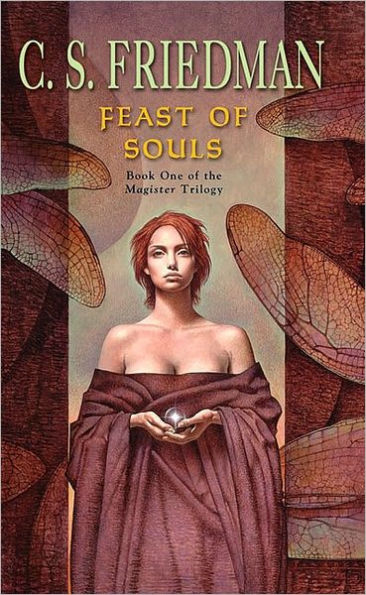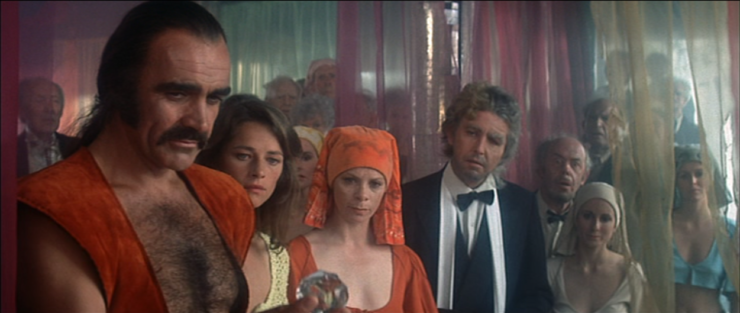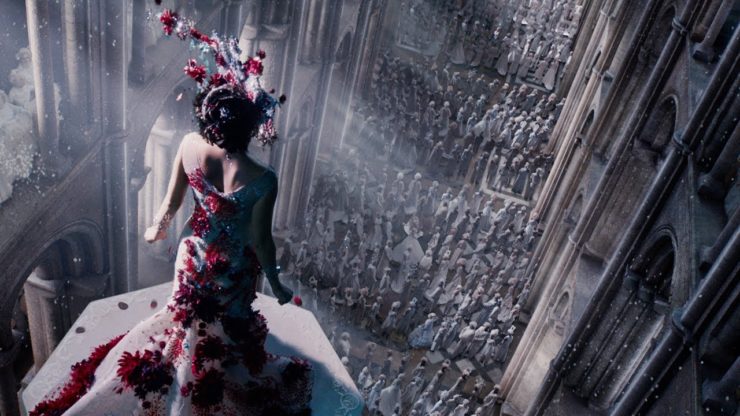Science fiction and fantasy are full of horrible ways you can die, but the genre has also been pretty inventive in horrible ways to live forever. There’s something about the fantasy of never dying that brings out the pedant and the cynic in us all. What would you do with all that time? Wouldn’t you lose your humanity? Surely there’d have to be an awful downside? And, of course – what terrible thing would you do to get it?
In Greek myth, Tithonus asked for eternal life, but forgot about eternal youth, and shriveled up into a grasshopper. Immortality always has a gotcha clause. Maybe it’s just too good to be true, or too painful to imagine, given that it’s not something we’re ever going to get. Either way, if you really want to live forever you’d better read the small print.
The Homeward Bounders by Diana Wynne Jones
Jamie is exiled from his own world by the shadowy forces that control the multiverse. He is shunted from world to world as a literal pawn in a literal game, and promised that if he can make it back to his own world, he’ll be free to return to his own life.
He teams up with other exiles as they struggle to break free and find their way home, but ultimately he discovers that the powers that be have played a hateful trick on him. He gets home, but it’s utterly changed. He thinks he’s still eleven years old, but more than 100 years have passed. His friends find their own futures in their own worlds, but Jamie’s only choice is to keep wandering, to stop the game from beginning again.
“It’s going to go on for such years too. I shall grow old in the end, but it’s going to take a long, long time… The bit that I’m going to hate is the first part, when I go and see Helen. Every time I go, she’s going to be older than me. There’s going to be a time when I shall still be about thirteen, and she’ll be an old, old woman.”
It’s at this point that you realize the narration has made a seamless transition over the course of the book from a prickly young man in over his head to a prickly old man who has seen too much. The ending is one of the bleakest I’ve ever read in a novel that’s allegedly for 8-12-year-olds, all rendered in DWJ’s devastatingly matter-of-fact prose: Jamie knows he’s doing the right thing, but his last line is “you wouldn’t believe how lonely you get.”
Buy the Book


The Homeward Bounders
Silver in the Wood by Emily Tesh
It takes a while to realize that the protagonist of Silver in the Wood is immortal, because he seems to live such an ordinary life – quiet and alone in his cottage in the woods. It soon becomes clear that Tobias is bound not just to his day-to-day routine but to an ancient duty. His immortality is more like a haunting, an endlessly recurring annual cycle of trauma which he is unable to change or leave. Agelessness is isolation, but it’s also detachment, and the loss of humanity that accompanies it. It’s only when mortal life intrudes on Tobias’ solitary existence that he’s able to break the cycle and truly exist in the world again.
Buy the Book


Silver in the Wood
Feast of Souls by C.S. Friedman
The first installment in Friedman’s Magister Trilogy puts a remarkably unsettling spin on vampire-style immortality. Under the standard model of vampirism, the vampire lives forever and perhaps gains some dark power by preying on or parasitizing unsuspecting mortals. This obviously makes for a versatile metaphor (It’s all about sex! It’s all about drugs! It’s all about syphilis!), but Friedman goes a step further. In this setting, users of magic can burn through their own life-force for power, hastening an early death – or they can choose to drain the life of another, and potentially live forever. The twist is that they have no choice or knowledge of the person whose life they steal. As they grow stronger, someone else somewhere in the world weakens and slowly dies – and the Magister almost never has to see them suffer or face any consequence. The slow-burn horror of this scenario really springs from how close to the bone it cuts. Consider the world we live in – whose days and years of life are sapped away, and for whose benefit?
Buy the Book


Feast of Souls
Jupiter Ascending dir. the Wachowskis

Jupiter Ascending is perhaps better known for being “the one where bees can sense royalty” or “the one where Channing Tatum is a wolf-angel hybrid” (sorry, Lycantant splice). But it also takes the Feast of Souls model a step further. Eternal life is harvested from unsuspecting worlds, processed, and treated as currency by a depraved space aristocracy, who presumably need it to fund their Swarovski habit. Interplanetary civilization is a huge immortality farm, and the economic model rests on everyone trying not to think too hard about how their currency is literally derived from industrialized planetary extinction. Nobody can escape complicity, and while the heroine manages to negotiate a temporary reprieve for Earth and her loved ones, her individual ability to change the system is limited. It’s really a testament to the sheer bizarre fun of this movie that the experience doesn’t feel identical to being clocked repeatedly over the head by a gigantic metaphor for the parasitic qualities of late-stage capitalism.
Zardoz dir. John Boorman

Zardoz opens with a gigantic stone head descending from the heavens to announce that the gun is good! the penis is evil! to an audience of marauders in the wasteland. The main character is Sean Connery in a bright red tactical bikini. It is resoundingly weird. Like all of John Boorman’s work, it feels as if it may have come to us from an alternate timeline where things are just slightly richer and stranger.
The decadent Eternals live in a sealed dome and squabble for power, manipulating the starving, rapacious Brutals outside. The Eternals are terrified that what they have will be taken away from them, either by death or by the outsiders they have exploited, but they are fossilized inside their immortality, obsessed with death to the point of longing. Conformity is enforced by an arbitrary legal system which inflicts aging as a punishment. Dissidents are institutionalized in what seems to be a macabre, endless party. Others, paralyzed by apathy, fall into a living death. Zardoz depicts a heat death of society in which boredom itself becomes a cosmic horror.
17776 by Jon Bois
The people of 17776 are the people of today, except that for 15,000 years nobody has died. Unexpectedly and inexplicably, nobody on earth has got old or sick, or been injured, or been able to commit violence.
There are whispers of melancholy. At one point a stray ball destroys the last incandescent bulb in existence. Existential horror is not absent. Nobody knows exactly why this has happened and 15,000 years is a very long time. But on the whole an eternity without suffering turns out to be pretty good. No longer troubled by disease, war or poverty, the people of 17776 devote themselves to games in every form: alone, together, on a grand scale or in miniature or hiding in a cave.
Stories about immortality are obviously stories about mortality, and how we can bear it. The usual conclusion is that finality and suffering make existence meaningful. 17776 offers a counter-argument. Maybe the silly things we do – solving puzzles, breaking records, completing collections, obsessively tracking sports statistics – are more than distractions. Without fear and grief, the point of life is play.
The grand tragedy of living forever is usually that you’re alone. Sometimes your loneliness is worse because you can only live by exploiting others, or because you’re afraid your power and status can be taken from you. It’s individualism taken to its extreme, where life is a resource to be hoarded and only a few can come out on top. In this context, Bois’ optimistic vision of immortality starts to look genuinely subversive. Maybe it only works if everyone survives together. (It might also help if they like sports.)
A.K. Larkwood studied English at St John’s College, Cambridge, and now lives in Oxford with her wife and a cat. Her debut fantasy The Unspoken Name publishes February 2020 with Tor Books.










